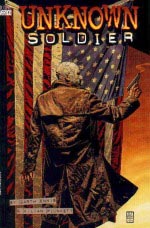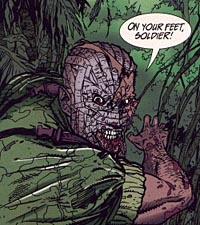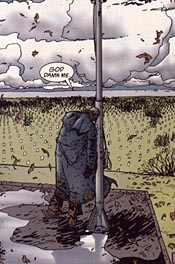>> The Friday Review: The Birthday Riots
>> The Friday Review: A Distant Soil: The Gathering
More...

 Writer: Garth Ennis
Writer: Garth Ennis
Artist:Killian Plunkett
Collecting UNKNOWN SOLDIER #1-4
Price: $14.95
Publisher: DC/Vertigo
ISBN: 1-56389-422-X
Comics are a medium unusually suited to nationalism, certainly in the UK and the US. In the UK, the likes of COMMANDO and BATTLE spent years (In COMMANDO's case, decades) telling stories with the same basic riff over and again: The English/Americans/Allies (delete as applicable) are heroes with white hats and a burning hatred for all things oppressive; The Germans/Japanese/Italians/Huns/Boer/Zulus (delete as applicable) are black-hearted, cowardly, dishonourable villains intent on nothing more than the destruction of all things good and true.
Basic? Certainly. But when you examine American comics exactly the same thing is present there. Superman's 'never ending battle' was initially against slum landlords and corrupt officials, then America's enemies in World War II. Captain America was created as a weapon to help the American forces in World War II and, in common with characters such as Captain Britain and USAgent, was designed to be the spirit of his country embodied.
Personally, that kind of character doesn't interest me too much, but the power that it - and, by extension, national pride - wields is indisputable. It was particularly evident over here during the 2002 World Cup, especially when England faced Brazil and we couldn't move for England flags. Mobile phones, banners, cars and even people's hair had all been converted to the cause.
In moderation, it's no bad thing, but when taken to extremes, nationalism becomes short sighted, arrogant and well within sight of fascism. Like all ideas, it can be hugely damaging when taken to extremes. And it's this idea of what damage can be caused - both personally and intellectually - by pride in one's nation, that lies at the heart of UNKNOWN SOLDIER.
 Ennis and Plunkett's four-part series is, on several levels, a remarkably subversive piece of fiction. The first and most obvious of level is its use of the Unknown Soldier himself as not so much a protagonist but both plot and plot device.
Ennis and Plunkett's four-part series is, on several levels, a remarkably subversive piece of fiction. The first and most obvious of level is its use of the Unknown Soldier himself as not so much a protagonist but both plot and plot device.
For much of the series, we hear of the Soldier instead of seeing him ourselves, his actions and appearance casting him more as bogeyman than soldier. He's an urban myth, an inhabitant of the same dark, shadowy world as the Illuinati or THE X-FILES' Cigarette Smoking Man. This is a brave and very post-modern move, taking a standard four-colour patriotic stereotype and turning him into something halfway between monster and idol. It's also worth noting that it's an interpretation that stays very true to the character, the 'one man can make a difference' creed that drives him being still very much in effect.
Using the Soldier as a means to tell the story as well as using him as a character within it also allows Ennis to make some fascinating points about the Intelligence community. As the story progresses, he interweaves the Soldier's almost religious devotion to America and it's cause with the increasingly ambiguous world climate. The same man who fought Hitler rides a tank into battle against the Shah of Iran, orders the murder of entire villages in Vietnam and leads Contras into battle in Nicaragua. He remains the man he always ways, but the field he works in is changing. The lines are no longer clear cut, or even static.
For a man who is used to knowing exactly what side he's on and who the villains are, the effect is devastating. The Soldier has given his life to defending America and its ideals, and suddenly finds that neither are what he thought they were.
It's this socio-political approach that allows Ennis to comment on both the main character and America's foreign policy. For much of the series, the two are synonymous, and as a result, it becomes not so much a thriller as a piece of fictionalised political commentary. Like previous writer Jim Owsley (known today as Christopher Priest), Ennis portrays the Soldier as a man who is both absolutely dedicated and absolutely aware of what he's doing. He receives his orders, carries his orders out and awaits further instructions. With no face and no identity beyond whatever his mission requires, he's as much a weapon as he is a soldier.
 However, in Ennis' hands, this weapon becomes two-edged. The dedication and ruthless devotion to duty that were assets in World War II seem increasingly out of place as the series moves closer to the present day and our perceptions of the Soldier change with them. He changes from a man with a terrifyingly direct sense of right and wrong into an almost naïve figure, operating on a code of honour that looks both dangerous and outdated. When viewed in this context, the comparisons are obvious, even down to the initials of the character himself.
However, in Ennis' hands, this weapon becomes two-edged. The dedication and ruthless devotion to duty that were assets in World War II seem increasingly out of place as the series moves closer to the present day and our perceptions of the Soldier change with them. He changes from a man with a terrifyingly direct sense of right and wrong into an almost naïve figure, operating on a code of honour that looks both dangerous and outdated. When viewed in this context, the comparisons are obvious, even down to the initials of the character himself.
However, in the final chapter the Soldier's motivations are revealed and they force the reader to completely re-evaluate what's gone before. Ennis deliberately divorces the Soldier from both his principles and US foreign policy, instead bringing the enormous burden placed on one man into stark relief. It's a brave move so late in the day, especially coupled with the series' final scenes, but it works supremely well. The Soldier remains both a monstrous and tragic figure, as all good myths should be. If the Soldier is a man out of his time, then he's far from alone. Agent William Clyde, the series protagonist, is a CIA Agent with a very similar worldview. He doesn't swear, does his job and no more and, somehow, manages to be a fairly decent human being in a world of lies and half-truths. As the series opens, Clyde is the subject of both gentle mocking and some admiration from his co-workers. He's an anachronism, but one that those around him seem at times strangely envious of.
Clyde is one of Ennis' most interesting main characters, equal parts James Stewart and Michael Biehn. Shy and retiring around women yet capable of fending off CIA assassins, he's a mass of contradictions that are all stripped away as the series progresses. Clyde's reason for pursuing the Soldier is both touching and chilling, a very personal choice in a story filled with decisions made for 'the greater good'.
It's in these scenes, reminiscent of the BBC's superb thriller EDGE OF DARKNESS, that the story really sings. Clyde's attempts to deal with events drive much of the final two chapters, with the final chapter especially revolving around his choices. Whether the choices he makes in the final chapter are brave or naïve is left up to the reader, but they are certainly very moving. If the Soldier is betrayed by his refusal to accept change, Clyde may ultimately be saved by his own refusal to do the same. As in all the best political thrillers, the final choice is left ambiguous.
UNKNOWN SOLDIER is a unique work, both for Ennis and VERTIGO. Its view of America is a far darker one than the sort Ennis usually favours, despite being tempered with compassion. Bleak, intelligent, funny and tragic, it's as much a story about loss as it is a thriller. Unique in both Ennis' body of work and VERTIGO's back catalogue, it's one of the most intelligent comic thrillers of the last decade and stays with the reader long after it's finished. There should be more books like this.

This article is Ideological Freeware. The author grants permission for its reproduction and redistribution by private individuals on condition that the author and source of the article are clearly shown, no charge is made, and the whole article is reproduced intact, including this notice.


